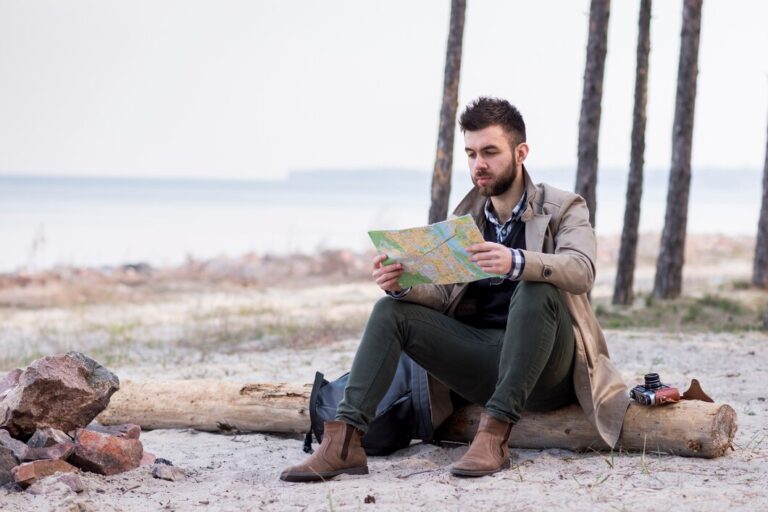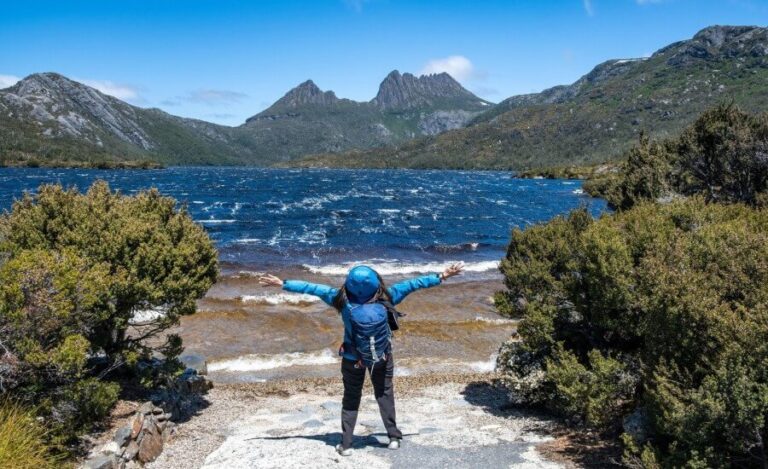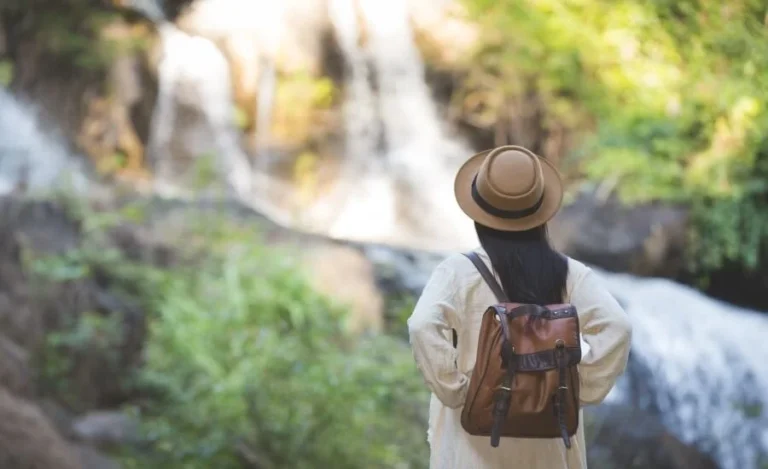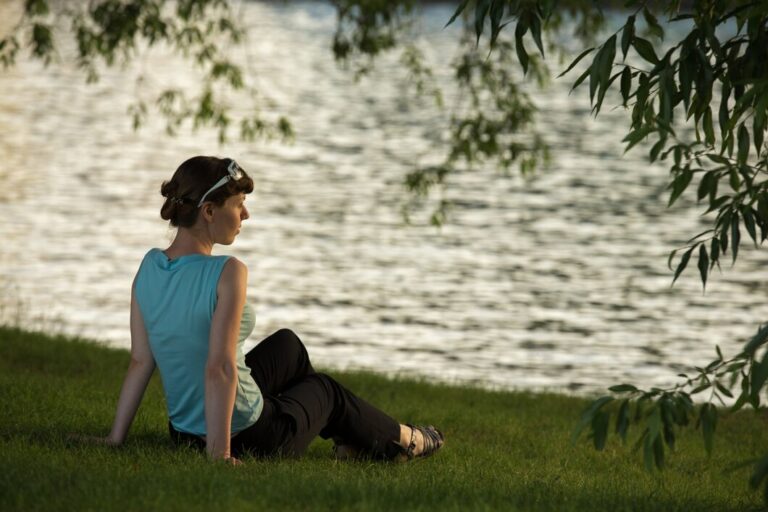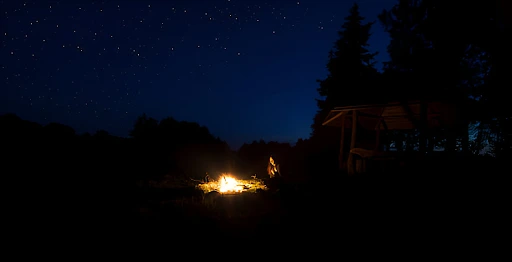
Do you ever feel…overly domesticated? Tamed by the constant glow of screens, the predictable comfort of central heating, the endless stream of digital notifications dictating your attention? Modern life, for all its conveniences, can inadvertently insulate us from the wilder rhythms of nature and, perhaps, from a deeper, more instinctual part of ourselves. We live in climate-controlled boxes, navigate by satellite, source food from brightly lit aisles, and often forget to look up at the vast, dark sky. There’s a subtle yearning, sometimes, for something more primal, more real.
Imagine stepping away from it all. Picture gathering around the flickering warmth of a campfire you built yourself, cooking simple food over open flames, the air filled with the scent of woodsmoke. Envision leaning back as darkness deepens, far from city lights, and gazing up at a breathtaking tapestry of stars, feeling both infinitesimally small and profoundly connected. This isn’t just camping; it’s an act of Rewilding Yourself: Campfire Cookouts and Stargazing in Remote Locations. This guide explores how these fundamental human experiences, undertaken mindfully and without technological tethers in quiet corners of the world, can help us shed the layers of modern conditioning, reconnect with our innate wildness, and find a unique form of inner peace.
What Does It Mean to ‘Rewild Yourself’? Reconnecting with Primal Rhythms
‘Rewilding’ often refers to restoring ecosystems to their natural state, but applying it to ourselves involves a similar principle: shedding the artificial constraints and conditioning of modern life to reconnect with our more innate, instinctual, nature-connected selves. It’s not about abandoning civilization, but about intentionally seeking experiences that nourish our primal needs and reawaken dormant senses and skills. It’s about remembering that we are nature, not separate from it.
Rewilding yourself involves stepping outside the comfort zone of constant connectivity and convenience. It means engaging directly with the elements – feeling the weather, navigating by landscape, understanding natural cycles. It encourages reliance on your own senses and resourcefulness rather than outsourcing everything to technology. Think less comfort, more connection; less simulation, more sensation.
Activities like building a fire, cooking simple food outdoors, navigating with map and compass, identifying plants or stars, or simply sitting quietly in a natural setting without distraction are all forms of personal rewilding. They tap into skills and awareness patterns that were essential for human survival for millennia but have become atrophied in our screen-centric world. It’s about rediscovering a sense of belonging within the wider web of life. This process can be profoundly grounding, perspective-shifting, and restorative for the modern soul.
The Ancient Call: Why Fire and Stars Resonate So Deeply
There’s a reason why gathering around a campfire and gazing at the stars feel so fundamental, almost sacred. These experiences are woven into our collective human DNA, holding deep, archetypal significance.
Fire: For hundreds of thousands of years, fire was central to human existence. It provided warmth, protection from predators, light in the darkness, and a means to cook food, making nutrients more available and fostering social cohesion. The hearth was the heart of the community. Gazing into flames connects us to this ancient legacy. The flickering light, the crackling sound, the radiant heat – these sensory inputs bypass the analytical mind and tap into a primal sense of safety, comfort, and connection. Sharing stories or silence around a fire feels inherently right because it echoes countless generations before us.
Stars: Before artificial light washed out the night sky, humanity lived under a brilliant celestial canopy. The stars were our first map, calendar, and source of mythology. Navigating by constellations, understanding seasonal shifts through celestial movements, and contemplating the vastness of the cosmos shaped human consciousness. Looking up at a truly dark, star-filled sky reconnects us with this sense of cosmic scale and wonder. It offers profound perspective, shrinking our earthly worries and reminding us of our place within an immense, mysterious universe. The sheer beauty and scale can evoke powerful feelings of awe, a key component of emotional well-being often lacking in our curated daily lives.
Engaging with fire and stars, especially in remote, natural settings, satisfies a deep-seated human need for connection to these fundamental elements.
The Joy of Unplugging Under Open Skies: Embracing Disconnection
Choosing to engage in campfire cookouts and stargazing in remote locations inherently involves, and is greatly enhanced by, disconnecting from technology. The very remoteness often means limited or no signal, but embracing this lack of connectivity as a feature, not a bug, unlocks deeper levels of presence and reward.
Undistracted Immersion: Without the constant lure of notifications or the impulse to check feeds, your attention is free to fully immerse in the immediate experience. You notice the subtle changes in the fire’s behavior, the nuances of flavour in food cooked simply, the gradual emergence of constellations as your eyes adapt to the dark. Your senses awaken when digital static is removed.
Enhanced Social Connection: Around a campfire, without phones mediating interaction, conversation flows more naturally. Silences become comfortable, shared moments of observation deepen bonds, and storytelling takes center stage. Connection happens face-to-face, eye-to-eye, heart-to-heart, enriched by the shared primal experience.
True Presence with Nature: Disconnecting allows you to attune to nature’s rhythms. You might hear owls calling, notice the scent of pine on the night air, feel the drop in temperature as the fire dies down. Stargazing becomes an act of pure observation and wonder, unburdened by the need to identify everything with an app or capture the perfect astrophotograph immediately. You become a participant in the night, not just an observer capturing it.
Mental Quietude: Stepping away from the relentless information stream of the digital world allows your mind to quiet down. The simple focus required for tending a fire or identifying a constellation provides a meditative anchor. This mental spaciousness is incredibly restorative, allowing for reflection, insight, and a welcome break from cognitive overload. The silence of nature mirrors a potential silence within. Have you experienced the profound calm that comes from being truly offline in a natural setting?
Rewilding Yourself: Campfire Cookouts and Stargazing in Remote Locations
Engaging in these activities mindfully transforms them from simple camping chores into powerful rewilding practices. Here’s how to approach them with intention:
The Hearth of the Wild: Mindful Campfire Cookouts
- Safety First & Respect: Always practice fire safety rigorously. Use established fire pits where available, clear the surrounding area of flammable materials, keep water and a shovel nearby, and never leave a fire unattended. Fully extinguish fires before leaving or sleeping (douse, stir, feel). Be aware of and respect any fire bans or regulations for the area. Follow Leave No Trace principles meticulously.
- Gathering Mindfully: If permitted and appropriate, gather fallen, dead, and dry wood respectfully. Notice the different types of wood, their textures, their readiness to burn.
- Building with Intention: Approach building the fire as a mindful process – arranging tinder, kindling, and fuel wood with care and attention to airflow. Notice the steps involved in coaxing a flame to life.
- Simple, Sensory Cooking: Forget gourmet complexity. Focus on simple, satisfying meals cooked over coals or on a grill. Think foil packet vegetables, sausages on sticks, simple stews in a cast iron pot, or just heating water for tea. Pay attention to the sounds and smells – the sizzle of food, the aroma of woodsmoke infusing the meal. Taste the food deliberately, noticing the unique flavour imparted by the fire.
- Tending the Flames: Maintaining the fire requires presence. Observe how it consumes fuel, how the coals glow, how the heat radiates. Adjust logs gently, mindfully feeding the flames as needed. This tending becomes a quiet meditation.
- Cleaning Up Consciously: Pack out all food scraps and trash. Clean cookware using minimal water and biodegradable soap away from water sources. Leave the fire pit cleaner than you found it.
Cosmic Connection: Mindful Stargazing Practices
- Seek True Darkness: Find a location far from city light pollution. Check dark sky maps (available online before your trip) or visit designated Dark Sky Parks/Reserves. Allow at least 20-30 minutes for your eyes to fully adapt to the darkness – avoid looking at bright lights, including phone screens (use a red light filter if absolutely necessary for charts).
- Get Comfortable & Look Up: Lie back on a blanket or mat, or sit comfortably. Let your gaze soften and simply take in the immensity of the sky. Resist the urge to immediately identify everything. Just be with the vastness.
- Use Analog Tools (Optional): A printed star chart (planisphere) for the current season/hemisphere or a simple astronomy book can help you identify major constellations, planets, or the Milky Way. Learn a few key constellations by sight (e.g., Orion, Ursa Major/Minor, Cassiopeia).
- Notice Movement & Change: Observe the slow apparent movement of stars across the sky due to Earth’s rotation. Look for satellites moving steadily or meteors streaking briefly. If observing over several hours or nights, notice how constellations shift position.
- Contemplate Scale & Time: Reflect on the immense distances and timescales involved. Consider that the light from some stars traveled for thousands or millions of years to reach your eyes. Let the experience foster a sense of awe and perspective on your own life and concerns.
- Listen to the Night: Combine stargazing with mindful listening. What sounds accompany the celestial view – crickets, wind, distant animals?
Choosing Your Remote Sanctuary: Finding Places to Unplug & Rewild
Finding the right location is key to a successful rewilding experience focused on campfires and stargazing. The goal is remoteness sufficient for dark skies and a sense of solitude, while still being accessible and safe for your skill level.
- Designated Dark Sky Places: International Dark Sky Parks, Reserves, and Sanctuaries are specifically recognized for their exceptional starry nights and protected nocturnal environment. Search the International Dark-Sky Association (IDA) website for locations near you or your travel destination.
- National/State Parks & Forests: Many large parks and forests, especially those away from major urban centers, offer backcountry campsites or dispersed camping areas (where permitted) with dark skies and opportunities for campfires (check regulations!). Research specific park rules regarding fires and camping.
- Bureau of Land Management (BLM) Lands / Public Lands (USA): In the US, vast areas of public land often allow dispersed camping and offer remote, dark sky conditions. Research specific area regulations, fire restrictions, and Leave No Trace practices diligently.
- Remote Coastal Areas: Coastlines far from towns can offer expansive sea-level views of the sky and opportunities for beach campfires (where permitted and safe – well away from dunes/vegetation, below high tide line).
- Desert Landscapes: Deserts often boast incredibly clear, dark skies due to low humidity and sparse population. Ensure you are prepared for desert conditions (water, temperature extremes).
- Mountainous Regions: Higher altitudes can offer clearer air and dramatic backdrops for stargazing, though weather can be more unpredictable. Choose accessible valleys or plateaus.
Key Considerations When Choosing:
- Regulations: Check fire restrictions (seasonal bans are common!), camping rules (permits, designated sites vs. dispersed), and any specific access requirements.
- Accessibility: Choose a location appropriate for your vehicle and hiking ability. Remoteness doesn’t have to mean extreme difficulty.
- Water Source: Ensure access to a reliable water source or plan to carry all the water you need.
- Safety: Research potential hazards (weather, wildlife, terrain). Inform someone of your plans.
Essential Analog Skills for Your Rewilding Journey
Embracing a tech-free rewilding experience often means relying on fundamental outdoor skills. Cultivating these enhances safety, confidence, and the sense of connection.
Basic Navigation:
- Map Reading: Learn to read topographic maps – understand contour lines, symbols, scale, and orientation. Practice orienting the map to the terrain.
- Compass Use: Learn basic compass skills – finding north, taking a bearing, following a bearing. Practice using map and compass together.
- Natural Navigation (Awareness): Pay attention to landmarks, the position of the sun, prevailing wind direction, and general terrain features to maintain situational awareness.
Fire Starting & Management:
- Safety Principles: Master fire safety rules (clearing area, water nearby, never unattended, full extinguishment).
- Tinder/Kindling/Fuel: Learn to identify and gather appropriate natural materials (dry leaves/grass, small twigs, larger branches). Practice different fire structures (teepee, log cabin).
- Ignition: Be proficient with matches and lighters in potentially damp/windy conditions. Consider learning ferro rod or other friction-based methods for a deeper rewilding experience (practice extensively!).
Leave No Trace Ethics:
- Plan Ahead & Prepare: Essential for safety and minimizing impact.
- Travel & Camp on Durable Surfaces: Avoid damaging vegetation.
- Dispose of Waste Properly: Pack it in, pack it out – ALL trash, including food scraps and toilet paper.
- Leave What You Find: Resist collecting natural objects. Avoid altering sites.
- Minimize Campfire Impacts: Use existing rings, keep fires small, burn wood completely to ash, extinguish fully.
- Respect Wildlife: Observe from a distance, never feed animals, store food securely.
- Be Considerate of Other Visitors: Maintain quiet, respect solitude.
Basic First Aid: Know how to handle common outdoor issues like blisters, cuts, burns, dehydration, and hypothermia. Carry an appropriate first-aid kit.
Common Concerns & Solutions for Rewilding Expeditions
Stepping into remote, tech-free environments naturally raises concerns. Addressing them with preparation and mindset shifts is key.
Concern 1: Safety in remote locations (wildlife, getting lost, lack of help).
- Solution: Thorough preparation is vital. Research the area, potential wildlife, and weather. Inform someone reliable of your exact plans and return time. Carry essential safety gear (first-aid kit, map/compass, emergency communication device like a PLB or satellite messenger for emergencies only if deep backcountry). Learn basic navigation and wildlife safety protocols. Start with less remote locations to build confidence.
Concern 2: I don’t have the skills (fire starting, navigation).
- Solution: Learn! Take introductory courses (navigation, wilderness survival, Leave No Trace). Practice skills in safe environments (e.g., fire starting in your backyard or a designated park area). Start with easier trips and gradually build complexity. Go with experienced friends initially. Resourcefulness grows with practice.
Concern 3: Fear of the dark or being alone in the wilderness.
- Solution: Acknowledge the fear; it’s natural. Start with trips involving friends. Use a reliable headlamp. Practice sitting quietly in the dark in safer settings to acclimatize. Learn about nocturnal animal behaviour – most avoid humans. Familiarity reduces fear. Focus on the beauty and sounds of the night.
Concern 4: I’ll be bored without my phone/internet.
- Solution: Reframe ‘boredom’ as ‘spaciousness’. This is the goal! Embrace the quiet. Engage your senses fully. Focus on tasks like fire tending or cooking. Read a book, journal, sketch, practice mindful observation, or simply sit and think. You might be surprised by the richness found in simplicity once the initial restlessness passes.
Concern 5: Campfire cooking seems difficult / I’ll just burn everything.
- Solution: Keep it extremely simple initially! Start with things that are hard to mess up (sausages on sticks, jacket potatoes wrapped in foil buried in coals, pre-made stew heated in a pot). Cook over established coals, not high flames, for more even heat. Practice makes perfect. Enjoy the slightly smoky flavour – it’s part of the charm!
Before You Go Checklist: Rewilding Campfire & Stargazing Trip
Prepare for your journey back to basics with this essential checklist:
- Location & Regulations: Choose location, check camping rules, fire restrictions, permits needed. Assess accessibility and safety.
- Inform Someone: Share detailed plans (route, location, timeline) with a reliable contact. Agree on check-in/overdue procedures.
- Navigation: Physical map(s) of the area, reliable compass (know how to use both). GPS device/app ONLY as emergency backup, ideally left off.
- Shelter & Sleep System: Tent/tarp/bivvy bag appropriate for weather, sleeping bag rated for expected temperatures, sleeping pad.
- Fire Starting Kit: Waterproof matches, lighter(s), fire starter (e.g., cotton balls with petroleum jelly, commercial starter), small hatchet/saw (if needed/permitted for processing wood).
- Cooking Gear: Simple pot/pan, cooking utensil(s), mug, eating utensil, biodegradable soap, small sponge/scrubber. Foil for packet cooking.
- Food & Water: Plan simple meals. Pack non-perishable food. Water filter/purification tablets or enough water carrying capacity.
- Clothing: Layers appropriate for weather (including potential changes), waterproofs, warm hat/gloves (even in summer for nights), sturdy footwear.
- Safety & First Aid: Comprehensive first-aid kit, headlamp/flashlight (extra batteries), knife/multi-tool, emergency communication device (optional, for deep remote areas).
- Leave No Trace Kit: Trowel (for catholes), toilet paper, waste bags (pack everything out).
- Analog Extras: Book, journal/pen, star chart/book, small sit pad.
- Mindset: Intention for presence, disconnection, learning, respect for nature.
Answering the Call of the Wild Within
In the heart of our increasingly complex and digitized world lies a simple, powerful truth: we are creatures of nature, deeply connected to the rhythms of the earth, the dance of flames, and the expanse of the cosmos. Rewilding Yourself through experiences like tech-free campfire cookouts and stargazing in remote locations is not about rejecting modernity, but about consciously nourishing those neglected parts of our being. It’s an intentional pilgrimage back to the essentials, a way to recalibrate our senses, quiet our minds, and rediscover our innate connection to the wild – both outside and within.
You’ve explored the meaning of personal rewilding, felt the ancient pull of fire and stars, understood the profound benefits of unplugging under open skies, and gathered practical knowledge for mindful campfire cooking and stargazing. You’re equipped with ideas for finding your sanctuary, essential analog skills, and ways to navigate common concerns. This journey invites you to embrace simplicity, cultivate presence, and find extraordinary richness in fundamental human experiences.
Can you hear the subtle call? The invitation to step away from the noise, to feel the earth beneath your feet, to tend a fire, to be humbled by the night sky? Plan your own small rewilding escape. Find a quiet corner, build a fire safely, cook a simple meal, and look up. Let the warmth of the flames and the light of distant stars remind you of who you are beneath the layers of modern life. The wild within awaits your return.
